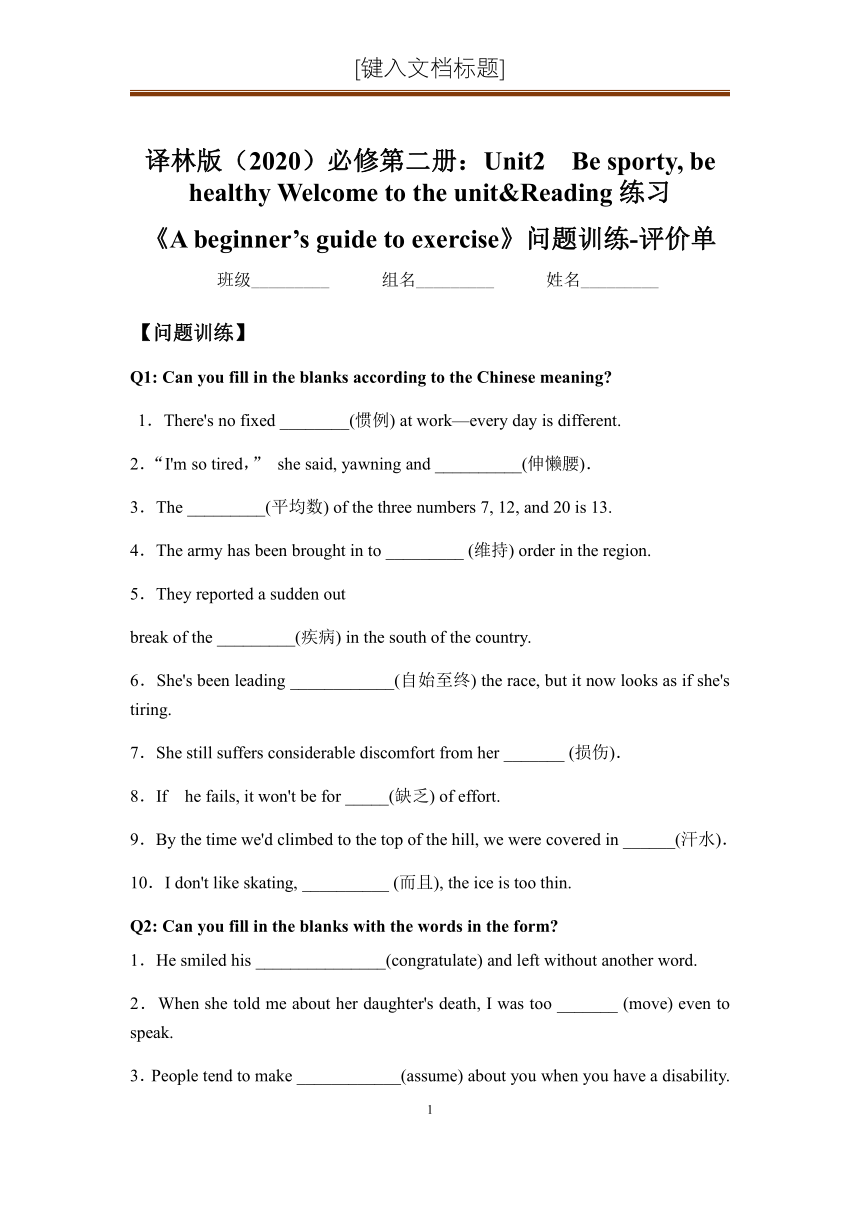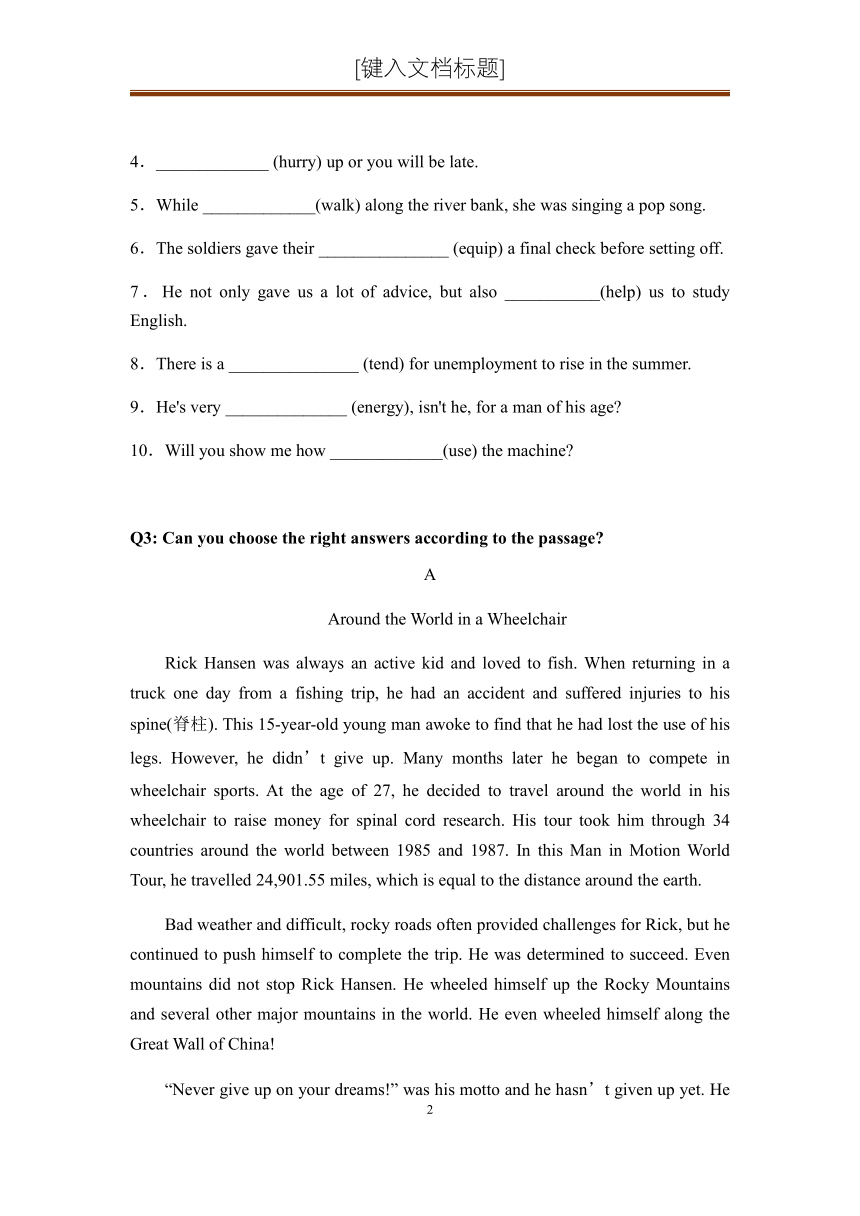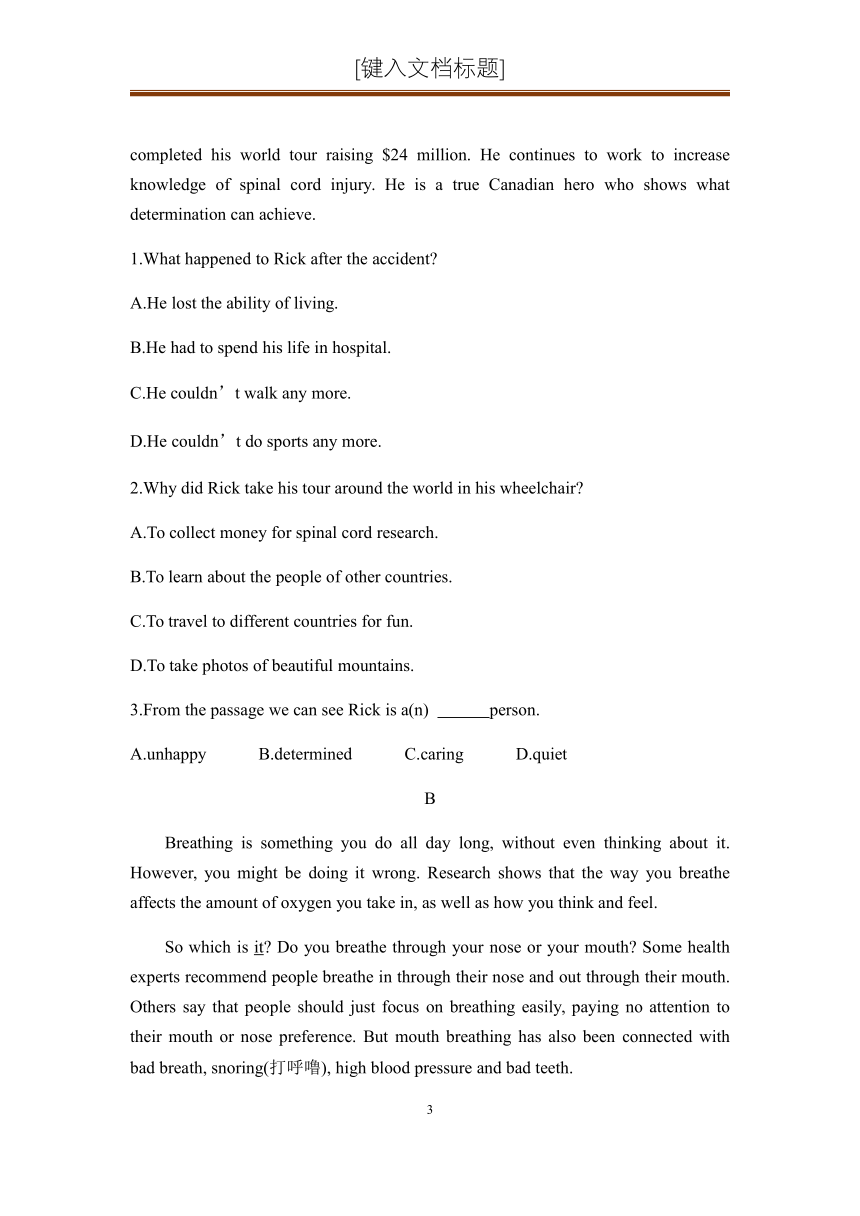译林版(2020)必修第二册:Unit2 Be sporty, be healthy Welcome to the unit & Reading练习(无答案)
文档属性
| 名称 | 译林版(2020)必修第二册:Unit2 Be sporty, be healthy Welcome to the unit & Reading练习(无答案) |  | |
| 格式 | docx | ||
| 文件大小 | 29.9KB | ||
| 资源类型 | 教案 | ||
| 版本资源 | 牛津译林版(2019) | ||
| 科目 | 英语 | ||
| 更新时间 | 2021-12-23 15:11:35 | ||
图片预览



文档简介
译林版(2020)必修第二册:Unit2 Be sporty, be healthy Welcome to the unit&Reading练习
《A beginner’s guide to exercise》问题训练-评价单
班级_________ 组名_________ 姓名_________
【问题训练】
Q1: Can you fill in the blanks according to the Chinese meaning
1.There's no fixed ________(惯例) at work—every day is different.
2.“I'm so tired,” she said, yawning and __________(伸懒腰).
3.The _________(平均数) of the three numbers 7, 12, and 20 is 13.
4.The army has been brought in to _________ (维持) order in the region.
5.They reported a sudden out
break of the _________(疾病) in the south of the country.
6.She's been leading ____________(自始至终) the race, but it now looks as if she's tiring.
7.She still suffers considerable discomfort from her _______ (损伤).
8.If he fails, it won't be for _____(缺乏) of effort.
9.By the time we'd climbed to the top of the hill, we were covered in ______(汗水).
10.I don't like skating, __________ (而且), the ice is too thin.
Q2: Can you fill in the blanks with the words in the form
1.He smiled his _______________(congratulate) and left without another word.
2.When she told me about her daughter's death, I was too _______ (move) even to speak.
3.People tend to make ____________(assume) about you when you have a disability.
4._____________ (hurry) up or you will be late.
5.While _____________(walk) along the river bank, she was singing a pop song.
6.The soldiers gave their _______________ (equip) a final check before setting off.
7.He not only gave us a lot of advice, but also ___________(help) us to study English.
8.There is a _______________ (tend) for unemployment to rise in the summer.
9.He's very ______________ (energy), isn't he, for a man of his age
10.Will you show me how _____________(use) the machine
Q3: Can you choose the right answers according to the passage
A
Around the World in a Wheelchair
Rick Hansen was always an active kid and loved to fish. When returning in a truck one day from a fishing trip, he had an accident and suffered injuries to his spine(脊柱). This 15-year-old young man awoke to find that he had lost the use of his legs. However, he didn’t give up. Many months later he began to compete in wheelchair sports. At the age of 27, he decided to travel around the world in his wheelchair to raise money for spinal cord research. His tour took him through 34 countries around the world between 1985 and 1987. In this Man in Motion World Tour, he travelled 24,901.55 miles, which is equal to the distance around the earth.
Bad weather and difficult, rocky roads often provided challenges for Rick, but he continued to push himself to complete the trip. He was determined to succeed. Even mountains did not stop Rick Hansen. He wheeled himself up the Rocky Mountains and several other major mountains in the world. He even wheeled himself along the Great Wall of China!
“Never give up on your dreams!” was his motto and he hasn’t given up yet. He completed his world tour raising $24 million. He continues to work to increase knowledge of spinal cord injury. He is a true Canadian hero who shows what determination can achieve.
1.What happened to Rick after the accident
A.He lost the ability of living.
B.He had to spend his life in hospital.
C.He couldn’t walk any more.
D.He couldn’t do sports any more.
2.Why did Rick take his tour around the world in his wheelchair
A.To collect money for spinal cord research.
B.To learn about the people of other countries.
C.To travel to different countries for fun.
D.To take photos of beautiful mountains.
3.From the passage we can see Rick is a(n) person.
A.unhappy B.determined C.caring D.quiet
B
Breathing is something you do all day long, without even thinking about it. However, you might be doing it wrong. Research shows that the way you breathe affects the amount of oxygen you take in, as well as how you think and feel.
So which is it Do you breathe through your nose or your mouth Some health experts recommend people breathe in through their nose and out through their mouth. Others say that people should just focus on breathing easily, paying no attention to their mouth or nose preference. But mouth breathing has also been connected with bad breath, snoring(打呼噜), high blood pressure and bad teeth.
Nose breathing may affect how memories are stabilized(稳定) in our brains, according to Swedish researchers. During their study, participants smelled 12 different smells and then were asked to breathe either through their nose or mouth for an hour afterwards. Then, they were presented with the original set of smells and a new set. Those who smelled with their nose remembered the smells better.
A research team recognized the differences in brain activity that occurred when seven epilepsy (癫痫) patients breathed through their nose or through their mouth. The team found three areas of the brain where activity is connected with breathing. These areas showed more changes in brain activity only when volunteers breathed through their nose.
So, should mouth breathers change their breathing habits If you’re happy with the way you breathe and if you aren’t experiencing any health problems, be yourself and just keep your own way. But if you think it might be time for a change, focus on breathing through your nose until it becomes a habit. It might help you survive an emergency.
4.What does the underlined word “it” in Paragraph 2 refer to
A.Your life style.
B.How you breathe.
C.How you think and feel.
D.The oxygen you take in.
5.What did Swedish researchers find
A.Nose breathing may improve memory.
B.Mouth breathing causes health problems.
C.Nose breathers are not sensitive to smells.
D.Mouth breathers have a good sense of taste.
6.What is the effect of nose breathing according to the research in Paragraph 4
A.It helps one to stay healthy.
B.It cures bad breath and snoring.
C.It makes one’s brain more active.
D.It improves one’s sense of smell.
7.What does the author think of nose breathing
A.It’s hard to get used to.
B.It’s suitable for everybody.
C.It’s what people have to do.
D.It’s what people can benefit from.
Q4 Can you fill in blankets
Start exercise, 1 you will take your first step towards a new and improved you! Regular exercise is 2 (benefit)to your body and mind. Physical activity increases the efficiency of your heart and 3 (lung). It is certain that active people tend to have better immune systems and are at lower risk 4 diseases.
Planning your exercise routine is necessary. Aerobic activities can develop your heart and lungs. Strength training 5 (increase) muscle strength and encourages bone development. Flexibility training helps stretch your muscles and improve your body’s range of 6 (move).
Eat and drink right and you will keep up your energy during a long workout. You are supposed to eat foods rich 7 protein. Do not eat immediately after exercise. Remember to drink throughout exercise to make up 8 water lost to sweat.
Wear proper clothes and 9 (equip) when exercising. In addition, you should start small and slowly work your way to a longer and harder exercise routine. Finally, remember 10 (warm) up before exercising and stretch at the end of your workout. Only in these ways can you avoid injury.
1. 2. 3. 4. 5.
6. 7. 8. 9. 10.
[键入文档标题]
1
《A beginner’s guide to exercise》问题训练-评价单
班级_________ 组名_________ 姓名_________
【问题训练】
Q1: Can you fill in the blanks according to the Chinese meaning
1.There's no fixed ________(惯例) at work—every day is different.
2.“I'm so tired,” she said, yawning and __________(伸懒腰).
3.The _________(平均数) of the three numbers 7, 12, and 20 is 13.
4.The army has been brought in to _________ (维持) order in the region.
5.They reported a sudden out
break of the _________(疾病) in the south of the country.
6.She's been leading ____________(自始至终) the race, but it now looks as if she's tiring.
7.She still suffers considerable discomfort from her _______ (损伤).
8.If he fails, it won't be for _____(缺乏) of effort.
9.By the time we'd climbed to the top of the hill, we were covered in ______(汗水).
10.I don't like skating, __________ (而且), the ice is too thin.
Q2: Can you fill in the blanks with the words in the form
1.He smiled his _______________(congratulate) and left without another word.
2.When she told me about her daughter's death, I was too _______ (move) even to speak.
3.People tend to make ____________(assume) about you when you have a disability.
4._____________ (hurry) up or you will be late.
5.While _____________(walk) along the river bank, she was singing a pop song.
6.The soldiers gave their _______________ (equip) a final check before setting off.
7.He not only gave us a lot of advice, but also ___________(help) us to study English.
8.There is a _______________ (tend) for unemployment to rise in the summer.
9.He's very ______________ (energy), isn't he, for a man of his age
10.Will you show me how _____________(use) the machine
Q3: Can you choose the right answers according to the passage
A
Around the World in a Wheelchair
Rick Hansen was always an active kid and loved to fish. When returning in a truck one day from a fishing trip, he had an accident and suffered injuries to his spine(脊柱). This 15-year-old young man awoke to find that he had lost the use of his legs. However, he didn’t give up. Many months later he began to compete in wheelchair sports. At the age of 27, he decided to travel around the world in his wheelchair to raise money for spinal cord research. His tour took him through 34 countries around the world between 1985 and 1987. In this Man in Motion World Tour, he travelled 24,901.55 miles, which is equal to the distance around the earth.
Bad weather and difficult, rocky roads often provided challenges for Rick, but he continued to push himself to complete the trip. He was determined to succeed. Even mountains did not stop Rick Hansen. He wheeled himself up the Rocky Mountains and several other major mountains in the world. He even wheeled himself along the Great Wall of China!
“Never give up on your dreams!” was his motto and he hasn’t given up yet. He completed his world tour raising $24 million. He continues to work to increase knowledge of spinal cord injury. He is a true Canadian hero who shows what determination can achieve.
1.What happened to Rick after the accident
A.He lost the ability of living.
B.He had to spend his life in hospital.
C.He couldn’t walk any more.
D.He couldn’t do sports any more.
2.Why did Rick take his tour around the world in his wheelchair
A.To collect money for spinal cord research.
B.To learn about the people of other countries.
C.To travel to different countries for fun.
D.To take photos of beautiful mountains.
3.From the passage we can see Rick is a(n) person.
A.unhappy B.determined C.caring D.quiet
B
Breathing is something you do all day long, without even thinking about it. However, you might be doing it wrong. Research shows that the way you breathe affects the amount of oxygen you take in, as well as how you think and feel.
So which is it Do you breathe through your nose or your mouth Some health experts recommend people breathe in through their nose and out through their mouth. Others say that people should just focus on breathing easily, paying no attention to their mouth or nose preference. But mouth breathing has also been connected with bad breath, snoring(打呼噜), high blood pressure and bad teeth.
Nose breathing may affect how memories are stabilized(稳定) in our brains, according to Swedish researchers. During their study, participants smelled 12 different smells and then were asked to breathe either through their nose or mouth for an hour afterwards. Then, they were presented with the original set of smells and a new set. Those who smelled with their nose remembered the smells better.
A research team recognized the differences in brain activity that occurred when seven epilepsy (癫痫) patients breathed through their nose or through their mouth. The team found three areas of the brain where activity is connected with breathing. These areas showed more changes in brain activity only when volunteers breathed through their nose.
So, should mouth breathers change their breathing habits If you’re happy with the way you breathe and if you aren’t experiencing any health problems, be yourself and just keep your own way. But if you think it might be time for a change, focus on breathing through your nose until it becomes a habit. It might help you survive an emergency.
4.What does the underlined word “it” in Paragraph 2 refer to
A.Your life style.
B.How you breathe.
C.How you think and feel.
D.The oxygen you take in.
5.What did Swedish researchers find
A.Nose breathing may improve memory.
B.Mouth breathing causes health problems.
C.Nose breathers are not sensitive to smells.
D.Mouth breathers have a good sense of taste.
6.What is the effect of nose breathing according to the research in Paragraph 4
A.It helps one to stay healthy.
B.It cures bad breath and snoring.
C.It makes one’s brain more active.
D.It improves one’s sense of smell.
7.What does the author think of nose breathing
A.It’s hard to get used to.
B.It’s suitable for everybody.
C.It’s what people have to do.
D.It’s what people can benefit from.
Q4 Can you fill in blankets
Start exercise, 1 you will take your first step towards a new and improved you! Regular exercise is 2 (benefit)to your body and mind. Physical activity increases the efficiency of your heart and 3 (lung). It is certain that active people tend to have better immune systems and are at lower risk 4 diseases.
Planning your exercise routine is necessary. Aerobic activities can develop your heart and lungs. Strength training 5 (increase) muscle strength and encourages bone development. Flexibility training helps stretch your muscles and improve your body’s range of 6 (move).
Eat and drink right and you will keep up your energy during a long workout. You are supposed to eat foods rich 7 protein. Do not eat immediately after exercise. Remember to drink throughout exercise to make up 8 water lost to sweat.
Wear proper clothes and 9 (equip) when exercising. In addition, you should start small and slowly work your way to a longer and harder exercise routine. Finally, remember 10 (warm) up before exercising and stretch at the end of your workout. Only in these ways can you avoid injury.
1. 2. 3. 4. 5.
6. 7. 8. 9. 10.
[键入文档标题]
1
